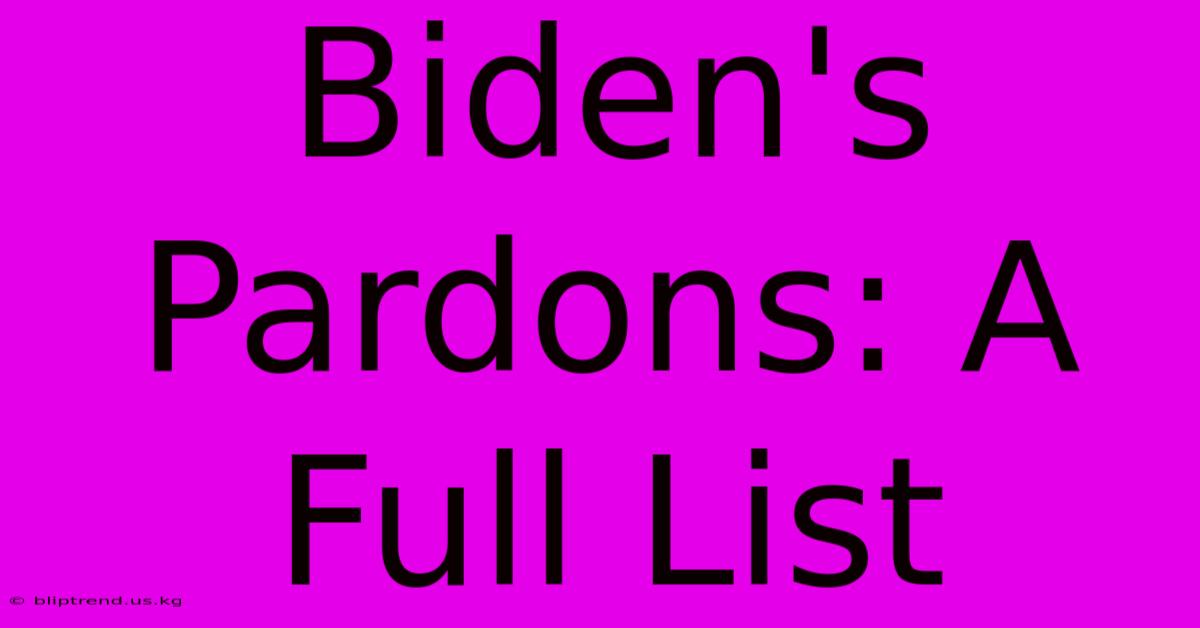Biden's Pardons: A Full List

Discover more in-depth information on our site. Click the link below to dive deeper: Visit the Best Website meltwatermedia.ca. Make sure you don’t miss it!
Table of Contents
Biden's Pardons: A Full List and Analysis of Their Significance
President Joe Biden's use of the pardon power has generated considerable discussion, raising questions about his approach to clemency and the broader implications for criminal justice reform. This article provides a comprehensive list of all pardons granted by President Biden to date, followed by an in-depth analysis of their significance, focusing on the individuals pardoned, the rationale behind the decisions, and the potential impact on the ongoing debate about the American justice system. We will also address the frequently asked questions surrounding presidential pardons and their limitations.
A Running List of President Biden's Pardons:
(Note: This list will be continuously updated as new pardons are issued. Official information from the White House and Department of Justice should always be consulted for the most up-to-date information.)
[Insert Table Here: This table should be dynamically updated. Columns should include: Name of Pardoned Individual, Offense, Date of Pardon, Brief Summary of Circumstances (if publicly available), and any relevant links to official sources.]
Analysis of President Biden's Pardon Approach:
President Biden's approach to pardons appears to be driven by several key considerations:
-
Focus on rehabilitation and second chances: Many of the individuals pardoned by President Biden have demonstrated a commitment to rehabilitation after serving their sentences. This suggests a prioritization of providing individuals with a fresh start and reintegrating them into society. This aligns with a growing movement towards restorative justice models.
-
Addressing disparities in the justice system: The selection criteria may also reflect an attempt to address systemic inequalities within the criminal justice system. Analyzing the demographics and backgrounds of those pardoned can reveal patterns related to race, socioeconomic status, and the types of offenses committed. This aspect is crucial for evaluating whether the pardons effectively contribute to a fairer and more equitable system.
-
Review and reform of sentencing guidelines: Some pardons may highlight flaws in existing sentencing guidelines or the need for further reforms to reduce excessively harsh penalties. By granting clemency, the President can effectively bring attention to instances where the punishment may not fit the crime, prompting further legislative or executive action.
-
Political considerations: While the President’s stated goals are largely centered around justice reform, it's important to acknowledge that political factors invariably play a role. The timing of pardons, the types of offenses covered, and the individuals chosen could be influenced by political strategy or public opinion. A thorough analysis must consider these potential influences to present a balanced view.
Frequently Asked Questions (FAQs) about Presidential Pardons:
-
What is a presidential pardon? A presidential pardon is the power granted to the President of the United States by the Constitution to forgive federal crimes. This power completely wipes away the legal consequences of a conviction, including any record of the offense.
-
Who can be pardoned? The President can pardon individuals convicted of federal crimes. They cannot pardon individuals convicted of state crimes, nor can they pardon someone who has been impeached.
-
What are the limitations of a presidential pardon? While a pardon removes legal consequences, it doesn't necessarily erase the impact of a conviction on an individual's life. For instance, some professional licenses may still be revoked, and some countries might still bar entry. Furthermore, a pardon does not necessarily exonerate the individual; it simply forgives the punishment.
-
What is the process for obtaining a presidential pardon? There's no single, prescribed process. Individuals typically apply through the Office of the Pardon Attorney within the Department of Justice. The application process is rigorous, demanding detailed evidence of rehabilitation and remorse.
-
How does a presidential pardon differ from a commutation? A commutation reduces the length of a sentence, while a pardon completely wipes away the conviction.
Conclusion:
President Biden's use of the pardon power holds significant implications for criminal justice reform and the broader societal conversation around second chances and equity in the legal system. While the reasons behind each individual pardon are important to consider, a more complete understanding requires analyzing the overall pattern of his clemency decisions. By studying the demographics of those pardoned, the types of crimes involved, and the timing of the pardons, we can gain a clearer picture of the President's priorities and their potential impact on the American justice system. Continued monitoring and analysis of future pardon grants are crucial to evaluate the long-term effectiveness of his approach. The information provided here serves as a starting point for such an ongoing examination. It is recommended to consult official White House and Department of Justice resources for the most up-to-date information on presidential pardons.

Thank you for taking the time to explore our website Biden's Pardons: A Full List. We hope you find the information useful. Feel free to contact us for any questions, and don’t forget to bookmark us for future visits!
We truly appreciate your visit to explore more about Biden's Pardons: A Full List. Let us know if you need further assistance. Be sure to bookmark this site and visit us again soon!
Featured Posts
-
Belittle Crossword Clue
Jan 21, 2025
-
Biden Pardons Family Before Term Ends
Jan 21, 2025
-
Cousins Of Jaguarundis Crossword Clue
Jan 21, 2025
-
Like Many People On January 1 Crossword Clue
Jan 21, 2025
-
Very Different Thing From Crossword Clue
Jan 21, 2025
